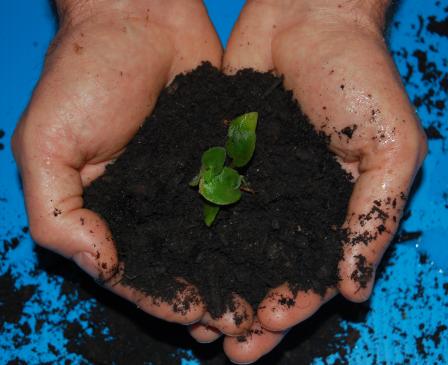 Union County, NJ – Backyard composting is an easy, convenient way to transform kitchen scraps and yard waste into a beneficial addition to soil in the garden. The process can be confusing for novices, but a free seminar at Union County’s Trailside Nature and Science Center last month helped to cut through the mystery with helpful tips for home gardeners and educators.
Union County, NJ – Backyard composting is an easy, convenient way to transform kitchen scraps and yard waste into a beneficial addition to soil in the garden. The process can be confusing for novices, but a free seminar at Union County’s Trailside Nature and Science Center last month helped to cut through the mystery with helpful tips for home gardeners and educators.
The seminar was taught by Rutgers Union County agent Michele Bakacs, through the Rutgers Cooperative Extension of Union County. It was the first in a three-part series aimed at helping members of the public learn the basics of growing a successful vegetable garden.
“The Freeholder Board is very proud to support the public outreach programs of the Rutgers Cooperative Extension,” said Union County Freeholder Chair Bette Jane Kowalski. “Ms. Bakacs did an excellent job of leading the attendees through a complicated topic, and we are all looking forward to the next session in the series.”
Compost helps garden vegetables, flowers and other plants grow because it adds nutrient-rich organic material to soil.
Tiny organisms create compost by digesting kitchen scraps, yard waste and other plant-based material. All the gardener has to do is create an environment that helps the microorganisms thrive, and they do the rest.
One key factor in a successful compost is selecting the right ingredients.
“I tell gardeners to be very picky,” explained Ms. Bakacs. For example, the mature seed-heads of weeds should not be added to a compost bin, because the bin may not generate enough heat to neutralize the seeds.
For similar reasons, plants that show signs of disease or infestation should be kept out of the compost. Other excluded items are kitchen scraps containing meat, grease or soap residue, as well as litter or other waste from household pets.
Even with these restrictions, most gardeners have an ample supply of materials suitable for composting on hand, including chopped-up vegetable scraps and coffee grounds from the kitchen, torn-up cardboard, dried leaves, and other yard waste.
Other conditions for a good compost pile are:
- A mix of “green” material (typically consisting of moisture-rich vegetable scraps from the kitchen) and “brown” material (dried leaves, chopped-up twigs and other dry or woody waste). Gardeners can set aside a supply of leaves and other brown material in the fall to use throughout the year.
- Enough moisture to keep the microorganisms happy – but not too much moisture. “As damp as a wrung-out sponge” is a good rule of thumb.
- Enough oxygen to keep the microorganisms happy. Turning the pile once a week with a pitchfork typically provides enough aeration.
- A suitable compost bin. Upright bins are recommended because they take up relatively little space. They are “fed” from the top with fresh material continuously throughout the year. If conditions are optimal, compost will begin appearing from the bottom of the bin in a matter of weeks.
Ms. Bakacs also recommended wheel-type compost bins for school gardens, because children can help aerate the pile by turning the wheel rather than having to handle heavy tools. Gardeners are advised to choose a larger model, as smaller bins of this type may not compost efficiently.
Gardeners can also try assembling layers of brown and green material into a large (but not too large) open-air bin. This “layer cake” method requires little effort and yields a big batch of compost.
The cake process can take as little as five weeks if the pile is kept moist and aerated. Gardeners using this method are advised to set up more than one bin, to keep fresh material from combining with composted material.
Additional guidance on home composting is available from the Rutgers Agricultural Experiment Station at njaes.rutgers.edu/fs811.
The next and final seminar in the Rutgers series at Trailside will be “Harvesting and Food Safety,” scheduled for Thursday, August 15 from 6:00 p.m. to 8:00 pm. Weather permitting, the seminar will include a tour of the adjacent Demonstration Garden.
The session is free but pre-registration is required at tinyurl.com/Rutgers-Vegetable-Series-2019.
The Rutgers Cooperative Extension of Union County is supported by the Union County Board of Chosen Freeholders and Rutgers, the NJ Agricultural Experiment Station, with offices at the Union County Complex in Westfield at 300 North Avenue East. For more information on public outreach and volunteer programs in Union County including Environmental Stewards, Master Gardeners, Master Tree Stewards and 4-H Clubs, visit ucnj.org/rce.
Trailside is located in Union County’s Watchung Reservation at 452 New Providence Road, in Mountainside. Ample free parking is available in the main parking lot.
For directions and more information about all programs at Trailside, visit ucnj.org/parks-recreation.
Quick links to all Union County environmental programs and activities are available at The Green Connection, ucnj.org/green-connection.
# #
For all Union County programs and services visit ucnj.org, call the Public Info Line, 877-424-1234, email info@ucnj.org or use the online Contact Form.
Connect with Union County on social media.
